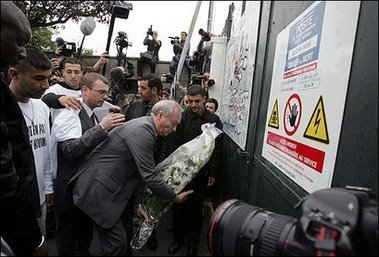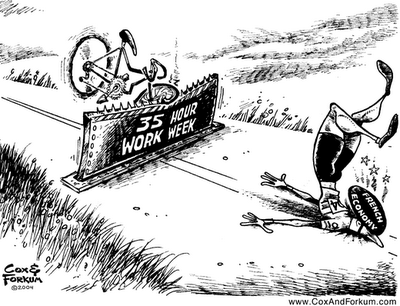
10. No one shall be disquieted on account of his opinions, including his religious views, provided their manifestation does not disturb the public order established by law.
Nul ne doit être inquiété pour ses opinions, même religieuses, pourvu que leur manifestation ne trouble pas l'ordre public établi par la loi.11. The free communication of ideas and opinions is one of the most precious of the rights of man. Every citizen may, accordingly, speak, write, and print with freedom, but shall be responsible for such abuses of this freedom as shall be defined by law.
La libre communication des pensées et des opinions est un des droits les plus précieux de l'homme: tout citoyen peut donc parler, écrire, imprimer librement, sauf à répondre de l'abus de cette liberté, dans les cas déterminés par la loi.
Déclaration des Droits de l'homme et du citoyenArticles X and XI approved by the National Assembly of France, August 26, 1789
FRENCH CRITIC OF ISLAM FLEES THREATSPARIS September 29, 2006 (IHT/NYT) - A public high school philosophy teacher and writer who attacked the Prophet Muhammad and Islam in a newspaper commentary has gone into hiding under police protection after receiving a series of death threats, including one diffused on a radical Islamist online forum.
Robert Redeker, 52, wrote in the newspaper Le Figaro [Face aux intimidations islamistes, que doit faire le monde libre ? (In the face of Islamist intimidation, what must the free world do?), September 19] that Muhammad was "a merciless warlord, a looter, a mass-murderer of Jews and a polygamist." He also called the Koran "a book of incredible violence."
Redeker also compared Islam unfavorably with Christianity and Judaism and criticized the hostile reaction to a recent speech by Pope Benedict XVI that seemed to link Islam and violence.
That day's issue of Le Figaro was banned in Egypt and Tunisia and Redeker was denounced by a commentator on Al Jazeera television.
Immediately afterward, Redeker, who teaches in a high school near Toulouse and is the author of several books on philosophy, began to receive death threats by telephone, e-mail and [on the Al Hesbah] Internet forum. The forum published photos of him, his home address, directions to his home and his cellphone number.
M. Redeker, his wife, and their children have all been threatened with death by Muslims protesting M. Redeker's claims of Islamic hate and violence. We are always bemused after someone denounces Islamic hate and violence how Muslims protest the claim by exhibiting the very hate, threatening the very violence claimed.
M. Redeker makes this same point during a radio interview on Europe 1:
"I have given a lot of thought in writing this text, in which each word is measured. I researched a lot. I read. ... What is happening to me corresponds fully to what I denounce in my writing: The West is under ideological surveillance by Islam."
TEACHER IN HIDING: 'I'M ALONE AND ABANDONED'PARIS, Sept 29, 2006 (AFP) - Robert Redeker, 52, is receiving round-the-clock police protection and changing addresses every two days, after publishing an article describing the Koran as a "book of extraordinary violence" and Islam as "a religion which ... exalts violence and hate".
He told i-TV television he had received several e-mail threats targeting himself and his wife and three children, and that his photograph and address were available on several Islamist Internet sites. "There is a very clear map of how to get to my home, with the words:
'This pig must have his head cut off'."
The government response has been a combination of real police work and political pieties.
The Paris state prosecutor's office Friday launched a preliminary inquiry for "criminal conspiracy in relation with a terrorist enterprise", asking the DST intelligence agency to look into the death threats.
But despite the government's assurances of support, Redeker accused the authorities of leaving him "alone and abandoned". Interviewed over the telephone from a safe house by Europe 1 radio Friday, he said that "the education ministry has not even contacted me, has not deigned to get in touch to see if I need any help."
On Thursday Education Minister Gilles de Robien expressed "solidarity" with the teacher, but also warned that "a state employee must show prudence and moderation in all circumstances." Redeker said that "if Robien is correct, then we would never have had any intellectual life in France. The function of politics is not tell us what we are allowed to think, but to defend our freedom to think and speak out."
... Speaking on RMC radio, Prime Minister Dominique de Villepin said such threats were "unacceptable".
"We are in a democracy, everyone has the right to express his views freely — of course while respecting others. That is the only restriction that is acceptable on this freedom."




